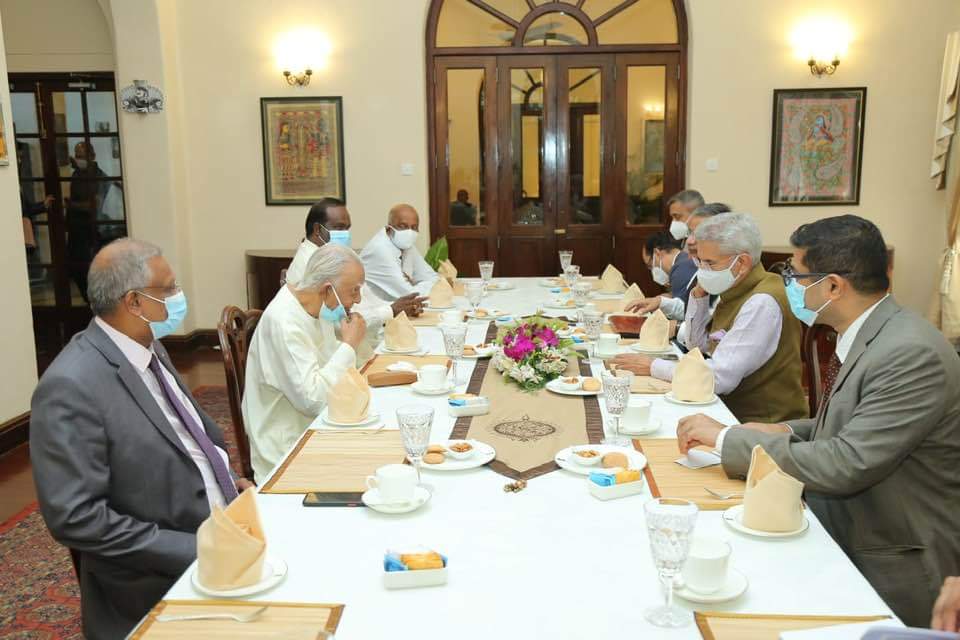A significant event in Colombo this week was the meeting between Indian External Affairs Minister (EAM), Subrahmaniyam Jaishanker and a delegation from the Tamil National Alliance (TNA). Jaishankar was in Colombo for the BIMSTEC summit.
“Vanakkam,” intoned Dr Jaishankar greeting TNA leader Rajavarothayam Sampanthan last Monday at the India House. He then asked him” Saukiyama?” or are you well. That was in Tamil. The Indian EAM was born in New Delhi and is one of three sons of Krishnaswamy Subramaniyam and Sulochana Jaishanker who have their origins from Tiruchirapalli and Chennai in Tamil Nadu respectively.
Samapanthan gave an overview of the discussions they had with President Gotabaya Rajapaksa on March 18 and asked Sumanthiran to explain the details. Sumanthiran declared that the President and his team wanted to discuss and negotiate a long-term political solution for the Tamil’s demand for devolution of power once the draft constitution is translated within the next two months. This, he declared, was agreed. However, he said, that the President further agreed to resolve several immediate issues faced by the people of North and the East — releasing persons detained under the Prevention of Terrorism Act (PTA) and held over a long term (over 10 years), and the cases of others in custody should reviewed; an immediate halt to land takeover by the military and the Government for reported archaeological investigations, wildlife and forest preservation etc; addressing the need for investigation of the disappeared and establishing a North-East Development Fund. There is no finality on this. However, TNA sources said that they hoped to receive funds from the Tamil diaspora and Tamil Nadu through this mechanism for development purposes.
Jaishankar had nodded in agreement and commented at the end that he felt satisfied that a process of negotiation had started and seemed to be clearly defining scope. He said the Indian government fully supported this process and encouraged the TNA to be proactive. He said for the first time he had heard by and large the same details being shared by the Government side as well as the TNA.
Jaishankar said India would encourage both parties to remain proactively engaged with belief and sincerity. He said President Rajapaksa has assured him that he is fully committed to delivering on the four immediate confidence building measures identified by the TNA as immediate issues to be resolved.
According to sources familiar with the discussion, the TNA team was also advised by a key member of the Indian team to enhance its dialogue with opposition political parties. In other words, it was felt that they were not interacting with the opposition groups very much. A TNA source said the remarks were “very significant” but declined to elaborate. Associated with the meeting was Indian High Commissioner Gopal Baglay.
TELO Leader Selvam Adaikalanathan intervened and tried to explain his party’s decision to boycott last Friday’s meeting with the President and said in Tamil that if India too was involved in the discussions as a possible mediator, then the TELO might reconsider attending future meetings with the Government. In response, Jaishankar said in Tamil that there were no plans or intentions for any direct involvement of India in any such talks.
Ahead of TNA’s talks with President Rajapaksa, diplomatic sources said, Adaikalanathan had been told to take part in the event. According to these sources, the TELO decision to boycott, despite advice, was the result of one of its key members holding office in a friendship organization where China is involved. However, TELO members deny the charge though they concede one of their top- rungers is a Joint Deputy Chairman of the organization.
In the same week, a delegation from the London-based Global Tamil Forum (GTF) led by Suren Surendiran, a group banned in Sri Lanka, had a meeting with top officials in the US Department of State. A tweet from the Department said: “The US values our relationship with diaspora communities who helped build bridges of understanding between Americans and the rest of the world. Assistant Secretary (David) Lu met with Global Tamil Forum at GTF online to discuss democracy, human rights, and economic challenges in Sri Lanka.”
With the State of Emergency in place, and a 36-hour curfew declared from 6 p.m. Saturday till 6 a.m. tomorrow, the government has already deployed troops district wise. It is determined to ensure no countrywide protests take place today. Thus, the battle lines are clearly drawn between the government and the public who are protesting.
This is whilst considerable international attention is being focused on developments in Sri Lanka, as the following tweets, will indicate:
The US Senate Foreign Relations Committee: Closely monitoring the situation in Sri Lanka. Out of an abundance of caution …..
The European Union: Concerned by the state of emergency, EU strongly urges Sri Lankan authorities to safeguard democratic rights of all citizens, including right to free assembly and dissent, which has to be peaceful. Challenging times for Sri Lankan people- EU continues to follow situation closely….
Sarah Hulton, British High Commissioner in Sri Lanka: Concerned by reports of the use of force against journalists and protesters, and the recently imposed Emergency Laws. A citizen’s right to protest peacefully is an essential part of democracy.
Julie Chung, United States Ambassador in Sri Lanka: Sri Lankans have a right to protest peacefully – essential for democratic expression. I am watching the situation closely, and hope the coming days bring restraint from all sides, as well as much needed economic stability and relief for those suffering.


